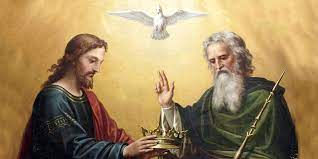EMBRACING THE MYSTERY OF THE TRIUNE GOD
Homily for the Trinity
Sunday (A)
Fr. Ugochukwu
Ugwoke, ISch
Scriptural Texts: Exodus
34:4b-6, 8-9, 2 Corinthians 13:11-13, John 3:16-18
Today
is Holy Trinity Sunday and the readings invite us to reflect on the
unfathomable nature of the Triune God. The understanding that God is one but
three finds its foundation in both Sacred Scripture and Sacred Tradition. While
the concept of the Trinity may seem mysterious and difficult to comprehend
fully, the Church seeks to explain this profound mystery based on the
revelation given to us by God himself.
Our
faith affirms the central teaching of monotheism, that there is only one true
God as revealed in the Scripture (Deuteronomy 6:4, Isaiah 45:5). In the first
reading, this one God reveals his attributes and character to us as being merciful,
gracious, and abounding in steadfast love. At the same time, our faith teaches
that within this one true God, there are three distinct persons: the Father,
the Son, and the Holy Spirit. While the three persons in one God are distinct,
they are also co-equal and co-eternal. (Matthew 28:19, 2 Corinthians 13:14, John
14:16-17).
In
other words, while there are three distinct persons in the Trinity, they are however
united in essence and share the same divine nature. The Father is God, and so
are the Son and the Holy Spirit. The Father, Son and Holy Spirit are not
separate gods, but one God (John 10:30, John 17:21). The three persons of the
Trinity are in a dynamic relationship with one another. They are in perfect
communion, love, and harmony (Matthew 3:16-17, John 14:26).
The
belief in the Holy Trinity carries profound lessons for Christians. First of
all, the Trinity reveals that God is a communion of persons, Father, Son, and
Holy Spirit, in a perfect and eternal relationship of love. As Christians, we
are invited to enter into this divine relationship and to live in loving
communion with one another. We are called to foster healthy relationships,
promote unity, and build communities based on love, respect, and selflessness. The
Trinity demonstrates that unity can exist amidst diversity. The three persons
of the Trinity are distinct, yet they are perfectly united in love and purpose.
Likewise, as Christians, we are called to embrace and celebrate our diversity- of
cultures, gifts, and backgrounds- while remaining united in faith and love. We
are reminded that our differences should not divide us but rather enrich our
communities and contribute to the building of God’s Kingdom.
Also,
the Trinity reveals the nature of God as love itself. The Father, Son, and Holy
Spirit exist in a perfect communion of love, constantly giving of themselves
for the other. As Christians, we are called to imitate this self-giving love in
our relationships with God and with one another. We are called to love
sacrificially, to serve others, and to prioritize the well-being of others
above our own interests. In addition, the Trinity affirms the equality and
dignity of each person within the Godhead. Though the three persons are
distinct, they are co-equal in their divine nature. This reminds us that all
human beings, regardless of gender, race, social status, or abilities, are
created in the image of God and possess inherent dignity. As Christians, we are
called to respect and uphold the equal worth of every person, advocating for
justice, inclusion, and the protection of human rights.
Lastly,
let us remember that the Trinity is a mystery to be contemplated and revered. While
we seek to deepen our knowledge and relationship with God, we also recognize
the limits of our comprehension. This teaches us humility, trust, and a sense
of awe in the presence of the Divine. That is why instead of seeking to fully
comprehend the mystery of God, the mystery of the Trinity rather invites us
into a relationship of love and communion with God, drawing us deeper into the
divine life through faith, prayer, and worship.



Thank you Fr. Ugochukwu. God bless you
ReplyDeleteThank you, Father.
ReplyDelete